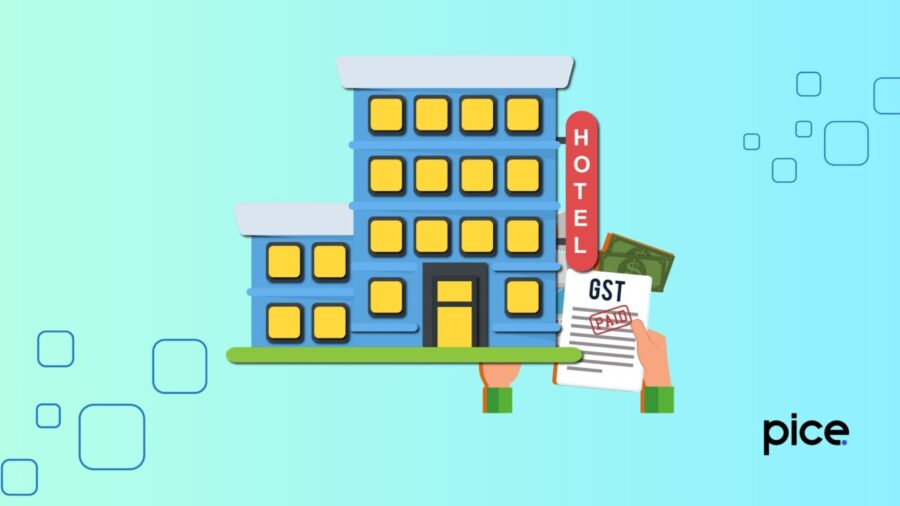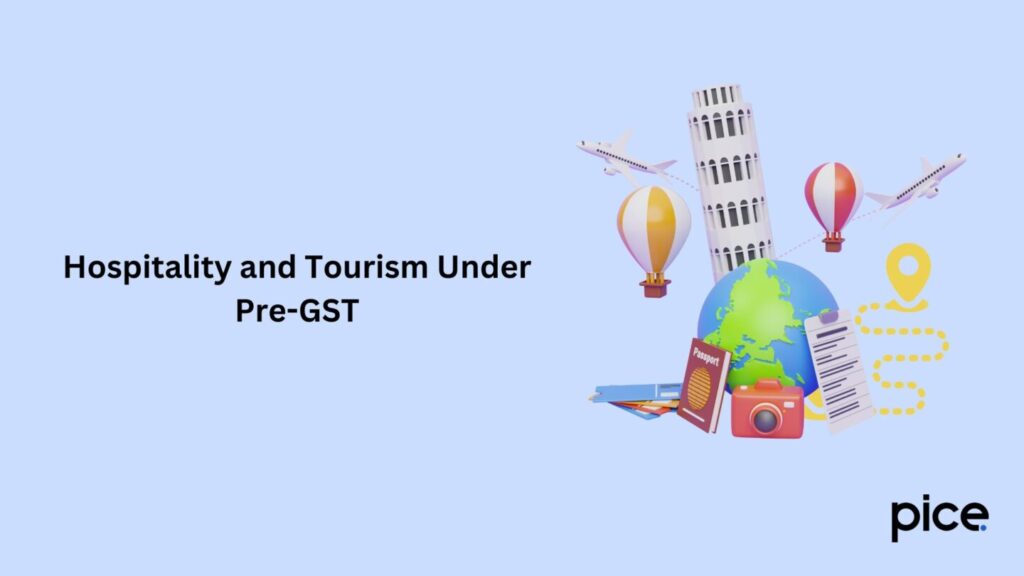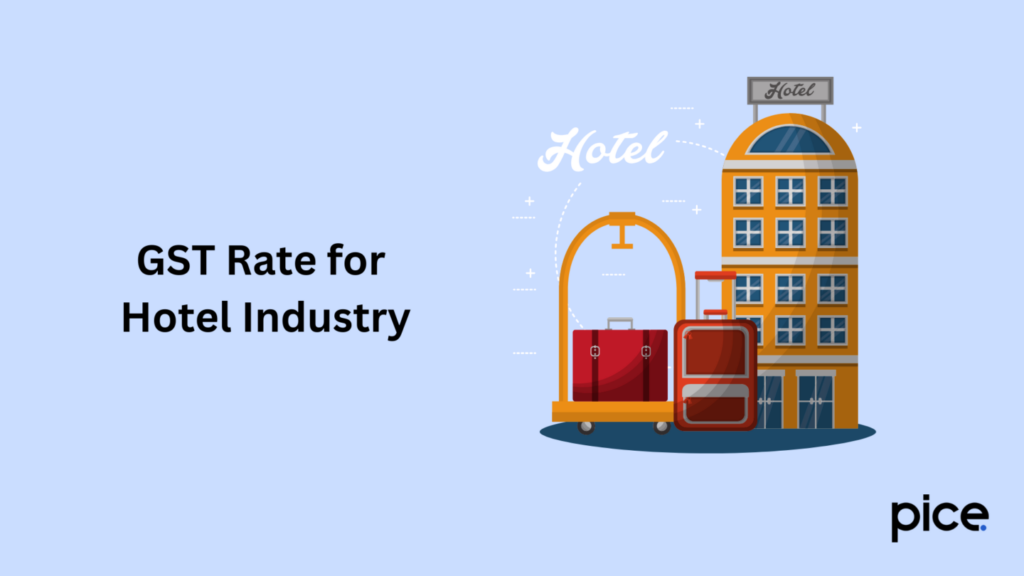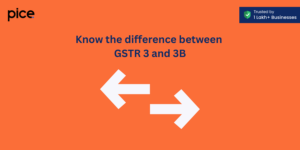GST on Hotel Rooms and Hospitality Industry
- 4 Sep 24
- 10 mins

GST on Hotel Rooms and Hospitality Industry
- ospitality and Tourism Under Pre-GST
- Hospitality and Tourism Under the GST Regime
- Pros of Goods and Services Tax
- Cons of Goods and Services Tax
- GST Rate for Hotel Industry
- Rate of GST for Restaurant Industry
- GST Rate for Marriage Hall, Banquet Hall and Catering Services
- GST Rate for Outdoor Catering Services
- GST Rate for Indoor Catering Services
- Hotel GST Rate for Cancellations
- GST Input Tax Credit (ITC) in Hotel Room
- Conclusion
Key Takeaways
- Unified Tax: GST simplifies taxation by replacing multiple pre-GST taxes with a single tax structure.
- Lower Costs: Reduced overall tax burden has made hotel stays and dining more affordable.
- Standard Rates: Uniform GST rates based on room tariffs streamline compliance for businesses.
- ITC Benefits: Businesses can claim Input Tax Credit on GST paid for business-related hotel stays.
- Luxury Impact: Higher GST on luxury services increases costs, potentially affecting tourism competitiveness.
With the implementation of the Goods and Services Tax (GST), several industries under the hospitality and tourism sector have gone through significant changes. For example, it offers uniform GST rates that have simplified compliance and improved the hospitality sector’s appeal to international tourists.
The GST regime has reduced the burden of multiple taxes and reduced overall costs for customers and businesses. However, there are several other factors to consider. So, let us discuss hotel GST rates in detail.
ospitality and Tourism Under Pre-GST

Before the implementation of GST, the hospitality and tourism industry in India operated under a complex tax regime that included VAT, luxury tax, service tax, excise duty and other taxes.
For hotel room tariff of more than ₹1,000, the service tax was 15%. An abatement of 40% on the tariff value reduced the effective service tax rate to 9%. Moreover, Value Added Tax (ranging from 12% to 14.5%) and luxury tax were imposed, increasing the total tax burden on buyers.
Earlier, the restaurant industry, including the e-commerce operators, dealt with a complex tax regime with a 60% discount on service tax, effectively 6% on food facilities and beverage costs, and VAT ranging from 12 % to 14.5%.
Additionally, bundled services like social functions and seminars were taxed with a 30% abatement. These combined taxes increased the overall consumer costs and complicated business compliances.
Hospitality and Tourism Under the GST Regime
GST makes tax rates the same across the board and lets businesses make better use of their tax credits. One significant change under this regime is the treatment of complementary services. For example, under the previous VAT regime, complimentary food facilities like breakfast were levied separate taxes. Now, such services are taxed as part of a bundled service, simplifying the tax process.
The GST rates for hotels are structured based on room tariffs. As of October 1, 2019, the rates are as follows:
- For rooms with tariffs less than ₹1,000 (when situated within the precincts of a registered religious place or charitable trust), the GST rate is Nil.
- For rooms (accommodation, food and beverage services) with tariffs up to ₹7,500, the GST rate applicable is 12%.
- 18% GST category for hotels is applicable for rooms with tariffs exceeding ₹7,500.
Overall, the GST has reduced the tax burden in the hospitality industry, encouraged industry growth and made it easier for businesses to track their tax bills.
Pros of Goods and Services Tax
Here are some of the key advantages of GST:
- More Clarity For Consumers
Under GST, consumers will see only one tax on their bills. This gives a clear picture of the tax along with affordability to consumers. Before GST, it was confusing for many people to distinguish between taxes such as VAT and entertainment tax. Moreover, GST has enhanced the affordability which boosted international, domestic and inbound tourism and opened employment opportunities.
- Improved Service Quality
Since there is only one tax to be calculated, credit cards are processed much faster in hotels and restaurants. This streamlines operations, reduces waiting times and increases customer satisfaction.
For the hospitality industry, this means more efficient service delivery, enabling guests to complete their transactions quickly and easily, ultimately saving valuable time and improving their overall experience. However, high GST rates for hospitality can affect this efficiency.
- Availability of Credit of Input Tax
The GST's input tax credit system allows hotels and restaurants to claim credit scores for taxes paid on inputs. Thus, this stops the double taxation and decreases the final effective rate of products and services. So, companies can now easily adjust these investments accordingly, simplifying their tax planning and potentially reducing costs.
Cons of Goods and Services Tax
Here are some of the disadvantages of GST that you should know about:
- Tax Rates are High on Luxury Services
One of the biggest challenges after the introduction of GST is the higher taxes on luxury hotels and high-end services provided by e-commerce suppliers, making them more expensive for tourists. This has reduced competition in the global luxury tourism market.
Moreover, the MICE (Meetings, Incentives, Conferences, and Exhibitions) segment of the tourism industry has been affected due to the higher cost of luxury and hotel services due to higher GST.
- Operational and Technological Challenges
When service tax was first introduced, it created a lot of confusion. While GST has clear guidelines on how each business should handle their accounts and submit refunds, it still requires businesses to be highly technically savvy.
- Impact on Pricing and Competitiveness
Higher taxes on tourism services in India have made tourism expensive and less attractive compared to neighbouring countries with lower taxes. In addition, varying GST rates and service charges have confused tourists and travel agents. This has lowered India's tourism appeal and made planning trips via e-commerce platforms more difficult.
GST Rate for Hotel Industry
The uniform tax rates for the hotel industry may vary based on the type of room, tariffs, services and more. As of October 2019, GST on hotel room tariff are as follows:

Hotel Rooms with a Tariff of ₹2,500 Per Day or Less
To rent hotel rooms, inns, or guest houses that have a daily tariff of less than ₹2,500, the recipient of service will have to pay a 12% GST. The GST rates applicable on hotel accommodation will also apply to clubs, campsites and other places meant for staying overnight with a room tariff between ₹1,000 and ₹2,500 per day.
Hotel Rooms with a Tariff of ₹5,000 Per Day or Less
In the case of hotel rooms, inns, guest houses, clubs, campsites or other lodging accommodations with a daily tariff between ₹2,500 and ₹5,000, an 18% applicable GST rate.
5 Star Hotels or Rooms with a Tariff of More Than ₹5,000 Per Day
For accommodations such as luxury hotels and those with higher ratings, as well as inns, guest houses, clubs, campsites and other similar locations where the cost of a room is more than ₹5,000 per night, a 28% GST is charged.
Rate of GST for Restaurant Industry
Much like hotels and inns, the GST rate on restaurant services also varies based on their type, air-conditioning, availability of liquor, etc.
Restaurants with No Air-Conditioning and No License to Serve Liquor
A 5% GST applies to food and drinks served in standalone restaurants (with no liquor license) without air-conditioning or central heating.
Restaurants with Air-Conditioning Facilities
An 18% GST on food bill is applicable in restaurants (with no liquor license) with the facility of air-conditioning or central heating.
Restaurants with License to Serve Liquor
For serving liquor, an 18% GST applies to the restaurant bills.
5 Star Hotel Restaurants
As per the category for restaurants, a 28% GST rate applies on food and drinks in an air-conditioned restaurant in hotel premises that is rated 5 stars or higher.
GST Rate for Marriage Hall, Banquet Hall and Catering Services
An 18% GST will apply to the composite supply of services like food or drinks with the primary service, i.e. rental of premises, such as hotels, banquets, convention centres, clubs, pandals or places that are specially arranged venues for functions.
Note that the supply of hotel services related to short-term accommodation, conferencing and banquet hall services provided to a SEZ developer or a SEZ unit are treated as inter-state supplies under GST.
GST Rate for Outdoor Catering Services
The GST rate on catering services (outdoor), including fooding facilities, is fixed at 18%.
GST Rate for Indoor Catering Services
Take a look at the following table to find out the applicable tax structure for indoor catering:
| Type of Services | GST Rate |
| Catering within hotels or other premises with a daily tariff of a unit of accommodation up to ₹7,501 | 5% GST without ITC |
| Catering in premises with a daily tariff of a unit of accommodation is ₹7,501 and above | 18% with ITC |
| Indian Railways Catering and Tourism Corporation Ltd. or their licensees/ Indian Railways | 5% GST without ITC |
Hotel GST Rate for Cancellations
When it comes to hotel cancellations, the GST rate remains consistent regardless of the rate applied during hotel booking. For cancellation fees, hotels will apply an 18% GST. So, whether you booked at 12%, 18% or 28%, the cancellation fee will attract the same GST rate.
GST Input Tax Credit (ITC) in Hotel Room
GST Input Tax Credit (ITC) allows businesses to claim a refund on the GST paid for hotel accommodations when used for business purposes. To benefit from ITC, companies must ensure that the hotel provides a GST invoice with the company’s GST number.
This is required for the company to claim the credit and allows the company to offset the GST paid against the tax liabilities.
For effective ITC claims, businesses should do the following:
- First, they must confirm that the hotel is registered for GST and provide a valid GST invoice.
- Then share the company's GST number with the hotel to ensure it is included in the issue of invoice.
- Online travel services providers present a curated selection of hotels that are applicable for issuance of invoice, enabling employees to book rooms directly from online platforms, with the system automatically incorporating the company's GST details for each booking.
By using ITC, companies can reduce their overall travel expenses, making business trips more cost-effective without compromising on travel quality.
Conclusion
The GST regime has reduced taxes and transformed the hospitality industry by standardising tax rates and simplifying the tax structure across the country. Before GST, the hotel industry faced complex state and central taxes, leading to confusion and inefficiencies. Therefore, understanding current GST rates on hotels is important for individuals as well as companies who want to manage their travel expenses.
So, by ensuring proper GST compliance and utilisation of input tax, you can easily reduce business transaction costs and ensure hassle-free annual return filings.
💡If you want to pay your GST with Credit Card, then download Pice Business Payment App. Pice is the one stop app for paying all your business expenses.
 By
By 

















